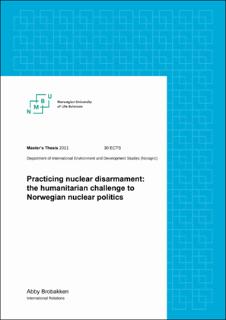Practicing nuclear disarmament : the humanitarian challenge to Norwegian nuclear politics
Master thesis

Permanent lenke
https://hdl.handle.net/11250/2833939Utgivelsesdato
2021Metadata
Vis full innførselSamlinger
Sammendrag
The belief that nuclear weapons provide states with security has for a long time dominated the nuclear conversation. The so-called ‘humanitarian initiative’ to nuclear weapons disarmament challenged this assumption. With the acknowledgement of the humanitarian harm that would result from a nuclear weapons detonation, the initiative quickly became a rationale to provide a legal instrument to prohibit nuclear weapons, following the Convention on Cluster Munitions in 2010. Norway, a small nuclear-umbrella state hosted the first conference with a focus on the Humanitarian Impact of Nuclear Weapons in March 2013. The conference’s aim was to provide an arena for a fact-based discussion about the humanitarian and developmental consequences that would result from a nuclear weapons detonation. However, when a demand for a legal instrument to prohibit nuclear weapons became the expressed goal of the humanitarian initiative from 2014 and onwards, Norway suddenly abstained from the process and has abstained from the humanitarian initiative since. What happened to Norway, and what knowledge was this policy decision based on? Inspired by critical practice theorists focus on politics as “competent performances”, this study seeks to understand the Norwegian practices of nuclear disarmament.
Utgiver
Norwegian University of Life Sciences, Ås
Med mindre annet er angitt, så er denne innførselen lisensiert som Attribution-NonCommercial-NoDerivatives 4.0 Internasjonal
Beslektede innførsler
Viser innførsler beslektet ved tittel, forfatter og emneord.
-
Performing nuclear peace : how nuclear weapons have kept Britain great from Thatcher to Blair
Beaumont, Paul (Master thesis, 2015-03-16)The question of why states maintain nuclear weapons typically receives short shrift: it’s security, silly. The international is a perilous place, and nuclear weapons represent the ultimate self-help device. Other ‘factors’ ... -
Power through progress : the nuclear rhetoric of Iran's supreme leader
Mirshahi, Maral (Master thesis, 2014-12-12)In this analysis, I ask the question: How has the Supreme Leader of Iran justified the nuclear program domestically between 2003 and 2013? Puzzled by how the Supreme Leader, Ayatollah Khamenei, has maintained support for ... -
Predictive machine learning on SEM and hyperspectral images of uranium ore concentrates (UOCs) for nuclear forensics
Lande, Isak Biringvad (Master thesis, 2020)Nuclear and radioactive materials are harmful to individuals, especially when it’s not professionally managed. Nuclear and radioactive materials going astray pose a great threat to the general public. The field of nuclear ...
